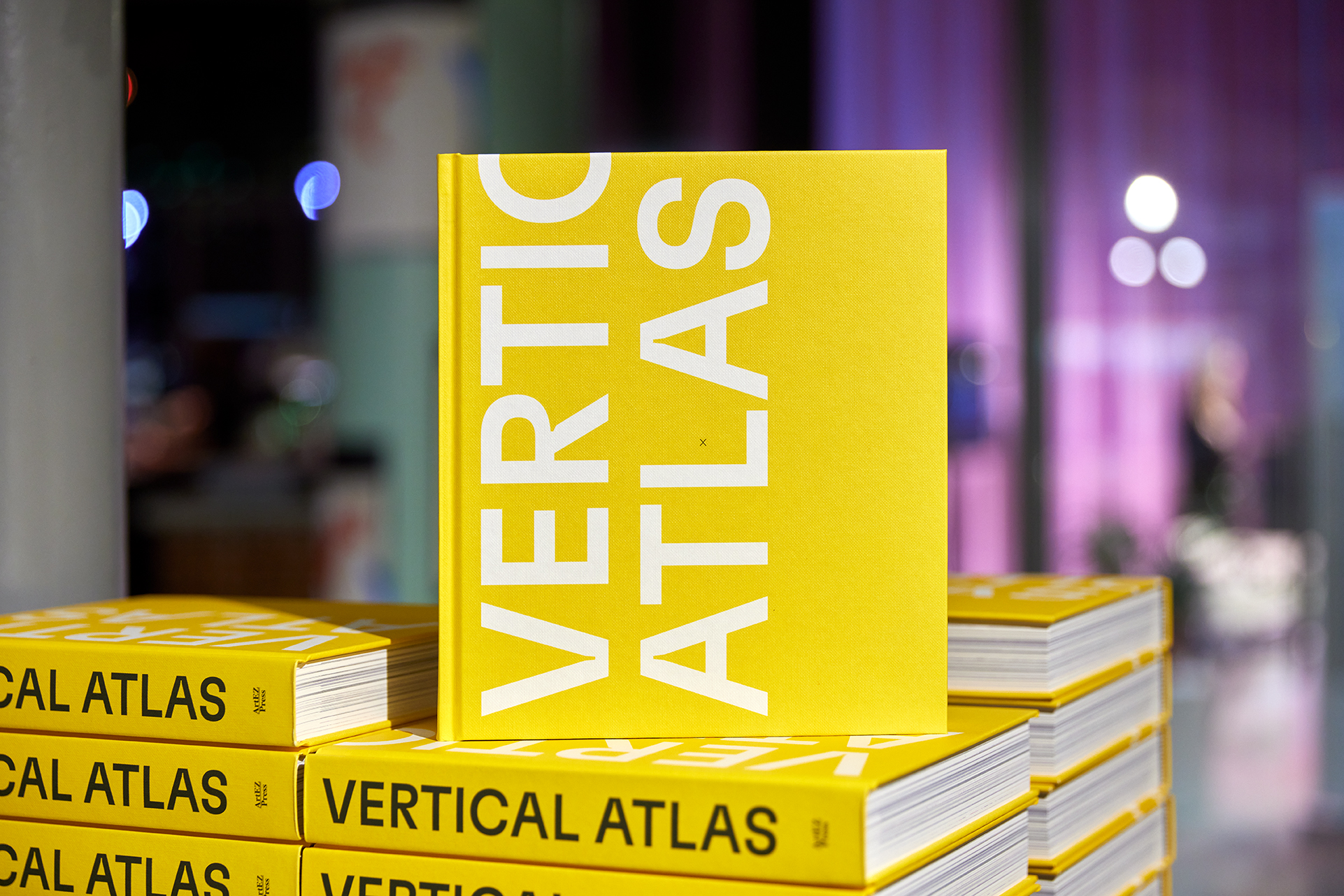Vertical Atlas Booklaunch at Het Nieuwe Instituut

Vertical Atlas, an art publication about the worldwide digital transformation
Out on October 27th: Vertical Atlas
Exhibition ‘Vertical Atlas’, 27th October - 27th November 2022.
How to navigate the rapidly changing digital geopolitics of the world today? How do we make sense of digital transformation and its many social, political, cultural, and environmental implications at different locations around the world? Vertical Atlas brings together the insights of a diverse group of internationally renowned artists, scientists and technologists from different backgrounds and places. From an investigation into the lithium mines in the Democratic Republic of Congo to maps of the fiber-optic submarine cables in the Atlantic and the ride-hailing platforms of China.
Vertical Atlas is the result of a four-year collaboration between Hivos and Het Nieuwe Instituut. Published by ArtEZ Press and edited by Leonardo Dellanoce, Amal Khalaf, Klaas Kuitenbrouwer, Nanjala Nyabola, Renée Roukens, Arthur Steiner and Mi You.
Book launch and exhibition opening ‘Vertical Atlas’: October 27th, 8 - 10pm at Het Nieuwe Instituut in Rotterdam, with a keynote by Nanjala Nyabola and Benjamin H. Bratton and a performance by artist Francois Knoetze.
Join us at Het Nieuwe Instituut in person or online. Livestream available https://stream.hetnieuweinstituut.nl/
Vertical Atlas is not a classic atlas that depicts the world in a uniform manner and it is also not a simple collection of traditional maps. It is a tool that enables comparisons, connections and contradictions between different and diverse visions, realities and worlds – through newly commissioned diagrams, interviews, essays and works of art by leading experts from around the world.

Contributions:
Nanjala Nyabola, The Phone Changed Everything
In her essay, The Phone Changed Everything, Nanjala Nyabola sheds a light on the political economy of the mobile phone in the context of Kenya. Borrowing the tools of geography Nyabola illustrates how the object intersects with power at different levels of society. “In a new era defined by connection and disconnection, the politics of the mobile phone brings many debates–surveillance, state power, the ethics of data collection, privacy, and more–into sharp relief,” she writes.
Pablo Desoto, Lucas Rolim and Alice Piva, The Killing of Marielle Franco: Cartography of a Techno-Political Assassination
The work The Killing of Marielle Franco investigates the assassination of Brazilian human rights activist and politician, Marielle Franco. On 14 March 2018, Franco and her driver Anderson Gomes were executed on the streets of Rio de Janeiro. Her murder was followed by an attack on her reputation through the circulation of fake images and disinformation on the Internet. The map presents an overview of the multiple agents involved in the event: bodies, urban routes, human users, bots, smartphone screens, digital militias, disabled surveillance cameras, WhatsApp groups, lethal weapons, and cloned car license plates. The map tries to unravel a complex story of two mechanisms of assassination: physical violence and the weaponization of smartphones that made it possible.
Francois Knoetze, Core-Dump ‘E-Revenant’
Artist and filmmaker Francois Knoetze uses found footage, sculpture, performance documentation and recorded interviews to explore the relationship between digital technology and colonialism. The work, produced in Dakar, Kinshasa, Shenzhen and New York, exposes how electronics hardware supply chains tap into old colonial trade arrangements, from the extraction of resources to e-waste sites. Big Tech corporations seeks to colonize emerging markets in Africa, while sweeping aside indigenous knowledge systems and imposing a centralized and homogenized cloud economy.
Bassem Saad: Conspiratorial Logistics and the Late Arab Spring.
Through maps and visualizations Bassem Saad presents a reflection on the ten years since the start of the Arab Spring, during which dissent has been crushed by overwhelming police repression, military coups, and authoritarian civil wars. The geographic scope of the map includes Lebanon, Syria, Palestine, Israel, Jordan, Egypt, Saudi Arabia, and Israel. The map touches on private regulations and cloud-infrastructural developments that sparked the revolt in each geographic context, as for example, in the case of the Lebanese uprising, the ‘WhatsApp tax’, the infrastructural disruptions accomplished by the protests, the geopolitical influences involved and accusations of foreign backing levelled at the protesters, and the contributions made by groups deleted from the dominant narrativization of the protests, such as migrant workers, refugees, and women’s rights groups.

Contributors:
Sophia Al Maria, Heba Y. Amin, Lotte Arndt, Benjamin H. Bratton, Kévin Bray, James Bridle, Ingrid Burrington, Adriana Bustos, Ben Cerveny, Guo Cheng, Chimurenga, Cristina Cochior, Sounak Das, Data Justice Lab (Philippa Metcalfe, Fieke Jansen), Pablo DeSoto, Alexis Destoop, Marjolijn Dijkman, DISNOVATION.ORG, Maarten Vanden Eynde, Cao Fei, Shuang Lu Frost, Maya Indira Ganesh, Pélagie Gbaguidi, GCC Group, Geocinema (Asia Bazdyrieva, Solveig Qu Suess), John Gerrard, Oulimata Gueye, Camille Henrot, Femke Herregraven, Yuk Hui, Sanneke Huisman, Victoria Ivanova, Vladan Joler, Isaac Kariuki, Klaas Kuitenbrouwer, Francois Knoetze, Srinivas Kodali, Bogna Konior, Lukáš Likavčan, Abu Bakarr Mansaray, Svitlana Matviyenko, Emo de Medeiros, Metahaven, Dorine Mokha, Jean Katambayi Mukendi, Musasa, Katja Novitskova, Nanjala Nyabola, Trevor Paglen, Alice Piva, Chen ‘Stanley’ Qiufan, Nii Quaynor, Elia Rediger, Tabita Rezaire, Lucas Rolim, Bassem Saad, Nanjira Sambuli, Georges Senga, Nzilani Simu, Andrej Škufca, Ksenia Tatarchenko, Suzanne Treister, Unknown Fields, Jordi Vallverdú, Richard Vijgen, Sarah Waiswa, Zhan Wang, Kedolwa Waziri, Mi You, Qiu Zhijie, Dan Zhu

On the occasion of the book’s publication, Hivos and Het Nieuwe Instituut organize a book launch and exhibition opening taking place 27th of October from 8 - 10 pm at Het Nieuwe Instituut, Rotterdam (Museumpark). The program features a keynote by Nanjala Nyabola; a performance by artist Francois Knoetze and a keynote by Benjamin H. Bratton. The video of the event is available here. If you want to attend physically, registration is required,
Edited by Leonardo Dellanoce, Amal Khalaf, Klaas Kuitenbrouwer, Nanjala Nyabola, Renée Roukens, Arthur Steiner and Mi You - Published by ArtEZ Press, 2022 - Design by Catalogtree - English language - 400 pages - Paperback - ISBN: 9789491444692

The book will be released 27 October via ArtEZ Press and is digitally accessible via verticatlas.net as of 27 October. For more information on the outcomes of the research labs linked to this project, visit digitalearth.art
Supported by Sida, Creative Industries Fund NL, New Silk Roads